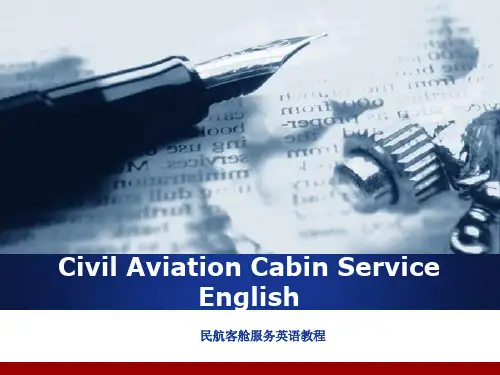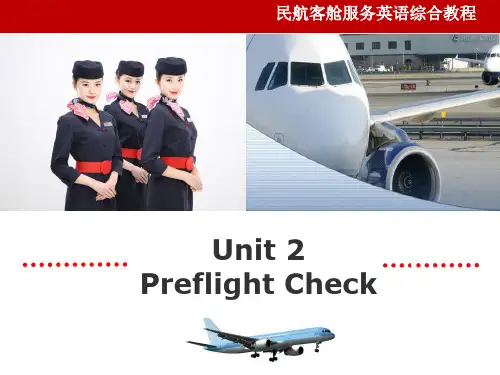最新民航客舱服务实用英语 Unit2
- 格式:ppt
- 大小:1.34 MB
- 文档页数:9


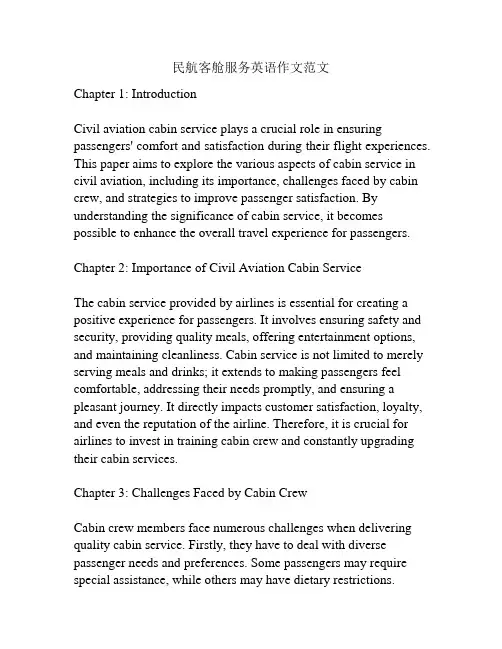
民航客舱服务英语作文范文Chapter 1: IntroductionCivil aviation cabin service plays a crucial role in ensuring passengers' comfort and satisfaction during their flight experiences. This paper aims to explore the various aspects of cabin service in civil aviation, including its importance, challenges faced by cabin crew, and strategies to improve passenger satisfaction. By understanding the significance of cabin service, it becomes possible to enhance the overall travel experience for passengers.Chapter 2: Importance of Civil Aviation Cabin ServiceThe cabin service provided by airlines is essential for creating a positive experience for passengers. It involves ensuring safety and security, providing quality meals, offering entertainment options, and maintaining cleanliness. Cabin service is not limited to merely serving meals and drinks; it extends to making passengers feel comfortable, addressing their needs promptly, and ensuring a pleasant journey. It directly impacts customer satisfaction, loyalty, and even the reputation of the airline. Therefore, it is crucial for airlines to invest in training cabin crew and constantly upgrading their cabin services.Chapter 3: Challenges Faced by Cabin CrewCabin crew members face numerous challenges when delivering quality cabin service. Firstly, they have to deal with diverse passenger needs and preferences. Some passengers may require special assistance, while others may have dietary restrictions.Additionally, cabin crew must manage conflicts among passengers and handle emergency situations effectively. Moreover, cabin crew often work long hours, deal with jet lag, and face challenging working conditions. All these factors make the job of cabin crew demanding and require them to possess excellent interpersonal and problem-solving skills.Chapter 4: Strategies to Improve Passenger SatisfactionTo enhance passenger satisfaction, airlines can implement several strategies. Firstly, airlines should ensure that their cabin crew members receive comprehensive training to enhance their service skills. This includes training in communication, conflict resolution, and emergency response. Secondly, airlines should regularly upgrade their onboard facilities to meet passengers' expectations. For example, providing comfortable seating, modern entertainment systems, and offering a variety of high-quality meals can significantly improve the overall travel experience. Lastly, airlines should take passenger feedback seriously and make necessary improvements based on suggestions received. This will demonstrate that the airline values its passengers' opinions and strive to enhance their experience.In conclusion, civil aviation cabin service plays an integral role in ensuring passengers' comfort and satisfaction during their travel experience. By understanding the importance of cabin service, exploring the challenges faced by cabin crew, and implementing strategies to improve passenger satisfaction, airlines can elevate the overall travel experience for passengers. This will result in increased customer loyalty and positive word-of-mouth, ultimatelybenefiting the airline's reputation.Chapter 5: Training and Development for Cabin CrewComprehensive training and development play a significant role in equipping cabin crew with the necessary skills and knowledge to provide excellent cabin service. Airlines should invest in implementing training programs that cover various aspects, including safety procedures, customer service, communication skills, and conflict resolution. These training programs should be conducted regularly to keep cabin crew updated with the latest industry standards and best practices.To ensure the effectiveness of training programs, airlines can use a combination of theoretical and practical training methods. Theoretical training can be conducted in classrooms or online platforms to provide cabin crew with the necessary knowledge about emergency procedures, regulatory requirements, and passenger service. Practical training can be conducted in simulated environments, such as mock cabins or emergency evacuation drills, to enhance cabin crew's ability to handle real-life situations efficiently.Additionally, airlines should focus on developing cabin crew's interpersonal skills. Effective communication and conflict resolution skills are crucial for cabin crew to address passenger needs, manage conflicts among passengers, and handle challenging situations. Training programs can include role-playing exercises and scenarios to help cabin crew practice their communication and problem-solving skills.Chapter 6: Enhancing Onboard FacilitiesTo improve passenger satisfaction, airlines should continuously upgrade their onboard facilities. This includes investing in comfortable seating arrangements, spacious legroom, and adjustable headrests to ensure passengers have a pleasant and comfortable journey. Airlines should also provide a variety of entertainment options, such as in-flight movies, music, and games, to cater to different passenger preferences.Moreover, the quality of onboard meals is an important aspect of cabin service. Airlines should consider offering a wide range of meal options to accommodate different dietary preferences and restrictions. Collaborating with renowned chefs or partnering with local food establishments can further enhance the quality of onboard meals.Maintaining cleanliness and hygiene onboard is another crucial factor in improving passenger satisfaction. Airlines should establish rigorous cleaning protocols and ensure that cabin crew members regularly clean and disinfect the cabin. Additionally, providing amenities such as blankets, pillows, and personal hygiene products can contribute to a more pleasant journey for passengers.Chapter 7: Listening to Passenger FeedbackOne of the most effective ways to improve cabin service and enhance passenger satisfaction is to listen to their feedback. Airlines should encourage passengers to provide feedback throughvarious channels, such as online surveys, feedback forms, or social media platforms. This feedback can provide valuable insights into areas that require improvement and help airlines identify trends and patterns.Airlines should take passenger feedback seriously and use it as a basis for making necessary improvements. This can include addressing specific issues raised by passengers, implementing changes suggested by them, or introducing new services based on their preferences. Regular communication with passengers, such as through newsletters or email updates, can also help keep them engaged and informed about any enhancements or changes made to the cabin service.Chapter 8: ConclusionEnhancing cabin service in civil aviation requires a holistic approach that encompasses training and development for cabin crew, upgrading onboard facilities, and actively listening to passenger feedback. By investing in comprehensive training programs, airlines can equip cabin crew with the necessary skills and knowledge to provide excellent service. Upgrading onboard facilities, such as seating arrangements, entertainment options, and meal quality, can significantly improve passenger satisfaction. Lastly, actively listening to passenger feedback and making necessary improvements based on their suggestions will demonstrate that the airline values customer opinions and aims to provide an exceptional travel experience.By implementing these strategies, airlines can elevate the overalltravel experience for passengers, resulting in increased customer loyalty, positive word-of-mouth, and a strong reputation in the industry. Cabin service is not just about serving meals and drinks; it is about creating a comfortable and memorable experience for passengers throughout their journey.。
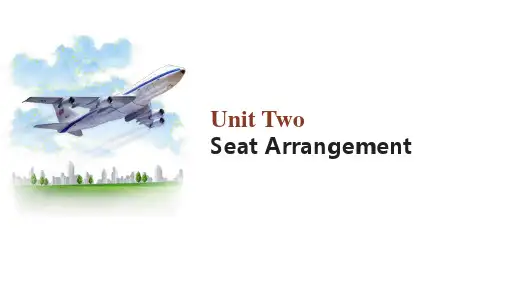


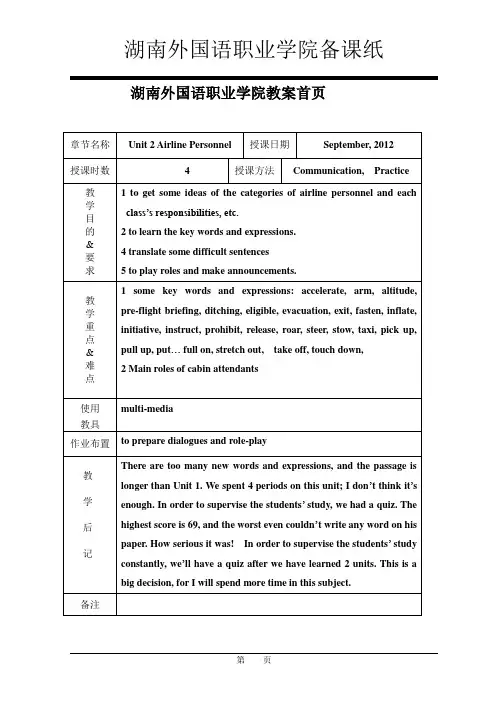
湖南外国语职业学院教案首页Period 1-2ⅠLead-inReview1 Translate the words, phrases and sentences below:1) 航站楼2) 有效护照3) 分配位子4) 问讯处5) 乘机手续台6) 护照检查处7) 安检处8) 行李认领9) 健康证明、接种证明和海关申请表10) 被隔离11) 外币兑换处12) 地勤人员13) 称行李14) 超重行李15) 候机室16) 头等舱/商务舱/经济舱17) 行李箱18) 登机19) 当班地勤人员20) 国内航线21) 排队22) 插队25) 告诉某人做某事26) 监视屏幕27) 检查可疑物品28) 假设某位旅客携带有金属制品,金属监测仪就会叫。
29) 任何旅客都享有免税商品限额。
30) 约在起飞前一小时,旅客到达登机口。
2 Fill in the forms:1 Check ______Check-in desk ①_______2 Weigh luggage ②_______③_______3 ____________2 if they ____ the metal detector ____ to use hand- held metal_______ .1 _________Departure lounge 2 _________3 _________1 one hour before departure, ______ .Boarding 2 show _______ .3 _______ before boarding the aircraft.1 Luggage reclaim①______Arrival ②______2 Immigration and customs ③______④______⑤______3 ______________.ⅡGeneral Ideas about Unit 2:Aims:1 to get some ideas of the categories of airli ne personnel and each class’s responsibilities, etc.〔了解航空工作人员的分类及每类人员的工作职责;〕2 to learn the key words and expressions.Teaching’s important points and difficulties(教学重点与难点):1 some key words and expressions:accelerate加速, arm使…处于可用状态, altitude海拔,pre-flight briefing起飞前会议, flight deck / cockpit驾驶舱,co-pilot / second officer副驾驶, chute滑道, ditching水上迫降, domestic国内的, elevator升降舵, eligible符合条件的,evacuation疏散, exit使离开, fasten系紧,fuselage机身, galley机上厨房, hydraulics液压的,inflate使膨胀, initiative首要的判断力, instruct发出指令,lavatory机上卫生间, prohibit禁止, purser乘务长,release释放, roar吼叫, rudder方向舵,steer控制…的方向, steward男乘务员, stewardess女乘务员,stow装载, taxi滑行, undercarriage起落架aerodrome controller机场管制, air traffic controller空管, air tug拖车, area controller地区管制, charter flight包机, control column操纵杆,cross check交叉检查, emergency equipment急救装置, first officer大副, flight engineer机上机械员, flight schedule飞行计划, flight service director主任乘务长, food and beverage supplies餐饮供给, fuel transfer换油,gear up收起落架, jump seat乘务员座椅, life vest救生衣,long haul长途〔旅行/ 运输〕short haul短途〔旅行/ 运输〕,main landing gear/ undercarriage主起落架, nose landing gear前起落架,on board在飞机上, parking stand停机坪, personality traits个性特征,pick up增加, public address system广播系统, pull up收起,put… full on把…全部加上, safety demonstration安全演示,seat- configuration座椅规格, seat- pitch座位间距, steering control方向控制, stretch out伸展, take off, touch down落地, wing flap翼襟2 Main roles of cabin attendants3 Long Sentences1) Airline Personnel is a generic term for people who work with aircraft in one capacity or another, whether they fly the aircraft, serve passengers or maintain an aircraft. 航空工作人员通常指的是以一种或另一种身份与航空工作有关系的工作人员,无论是飞机驾驶员,空乘服务人员,还是维修人员,都统称为航空工作人员。

